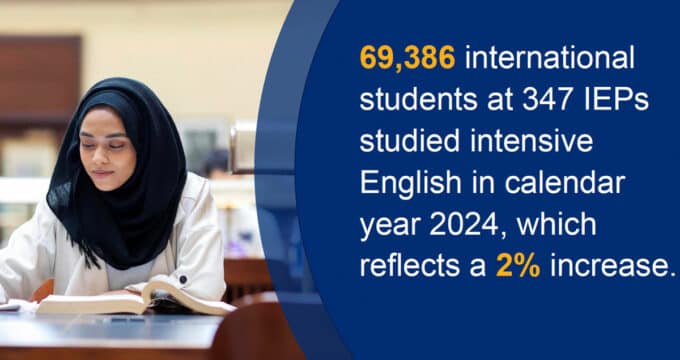Early lessons from moving ELT online: start with what makes your school special
- Many English Language Teaching schools shifted to online delivery earlier this year when the pandemic forced the suspension of in-person instruction
- Many have also been exploring opportunities to innovate or distinguish their online programmes in what has quickly become a very competitive field
- One early lesson in this respect is that good online strategy can often be informed by the underlying characteristics or strengths of the school’s core programmes
In the early months of this year, a growing web of public health measures and international travel restrictions arising from the COVID-19 pandemic caused English language schools to suspend face-to-face instruction. Many schools shifted almost immediately to online provision. For some, this was a stopgap measure designed to provide some continuing instruction to students enrolled at the point that campuses were closed. For others, it marked a shift toward a new delivery model that will likely make greater space for teacher-directed language learning online, both during and after the pandemic.
Students – and agents as well – are now faced with a wide range of new online language programmes, and are still measuring the quality of instruction and student experience on offer. Questions remain around pricing. But many wonder too how online language studies will continue to evolve as programmes are strengthened through further investment and development this year and as new study options are added.
In the midst of all that, we have been talking to agents and senior school staff across the industry to identify early successes, lessons learned, and examples of real innovation in online provision. We have several such examples in focus below. We have one overarching finding as well in that whatever it is that makes a school special – for example, the school culture or linkages to higher education institutions – can also be adapted and reflected in the online product.
Each of the schools that we’ll highlight below has found a way to do so, and this has helped establish the credibility of their online programmes and to differentiate them within a suddenly crowded field of providers of online language training.
“The teachers are the culture”
It was 12 March and Jonathan Kolber was on the road for a ski weekend with his family. Mr Kolber is the CEO of ILAC, a Canadian language school with campuses in Toronto and Vancouver, and he left the school that day thinking about how ILAC would have to respond to the growing threat of the COVID-19 virus. Only two days later, that answer became all too clear and in a weekend teleconference with the ILAC board it was determined that the school would close out of concern for the welfare of staff and students.
ILAC suspended in-person instruction on 16 March and in the week following it launched ILAC KISS, a new online programme delivering live English classes. The name reflects ILAC’s approach to online delivery, “Keeping it Simple and Smart”, and the student response has been telling.
ILAC became one of the first Canadian ELT schools to close in March, and, with ILAC KISS, also one of the first to launch a formal online programme. “The biggest surprise so far has been the engagement,” says Kolber. “Especially for our pathway students where we are seeing 90% attendance and just that students are very engaged in the online experience.”
“This has forced us to learn how to do online,” he adds. “And it’s not that hard if you keep it simple and smart. Our teachers have been the heroes for us, they have come together in amazing ways to make this happen.”
Bogie Lapinski Anaya leads Public & Media Relations for ILAC and she explains that one of the team’s big concerns in approaching online delivery was how to maintain the distinctive culture and community that has come to characterise the student experience at ILAC. “The discovery we made,” she says, “is that the teachers can still promote and enable that culture online — the teachers are the culture.”
With those early lessons in hand, it looks now like teacher-led online learning will have a bigger place at ILAC in the future. “We need to be online now,” says Kolber. “But we also see it as more of a blended learning tool in the future that will allow students to start their studies at home and then transition to study in Canada.”
The peer-to-peer effect
Hello! Exmouth welcomes thousands of students to its British seaside community each year. Most come from Western Europe, and most are juniors –– that is, students aged 18 years and younger that come for short-term group programmes, and especially so during the summer season.
All ELT schools in the UK closed in March and by then virtually all summer group programmes had been cancelled in any event. Italy, a major source of junior students for UK schools, had formally suspended all school group travel abroad earlier that month, and borders were beginning to close throughout Europe and around the world.
At that point, the Hello! Exmouth team also began to quickly move its programmes online, with a focus on one-to-one tutoring for students that would have otherwise come for a group programme this summer. Most junior students are hoping to connect with British students during their studies abroad, and so the team incorporated “buddy sessions” into its online programmes from the outset. In practice, this means that the first half of every session is one-to-one with just the student and the tutor. But then an English student of a similar age – the buddy – joins in for the second half of each session.
Buddies are recruited from area high schools, and Hello! Exmouth had an established pool of prospects throughout Europe ready to try its new approach. “We offered a free one-hour buddy session to all students who had had their group programmes postponed,” explains Managing Director Ella Tyler. The school is otherwise marketing its new online offer through partner schools and agents abroad, and through digital channels, especially paid campaigns on social media.
The big surprise so far is that the response to the new online service has been “really quite good”, says Ms Tyler. “In fact, much better than I thought it would be.”
The best-laid plans
The plan was nine months in the making – that was how long Yves Paradis and his team had been working on a new online programme for Open Hearts Language Academy (OHLA). In the early months of this year, the plan was still to launch in mid-April – a soft launch, really – with a small group of students and then to further develop the online programme from there.
Skip ahead to the week of 16 March when the Miami-Dade School District, along with most other school districts in Florida, closed their schools. OHLA followed suit and closed its centres in Miami, Boca Raton, and Orlando.
The message to students at the time, says Mr Paradis, OHLA’s vice-president of operations, was, “Give us a week.” During that week, the original plan went out the window and, following an intensive round of teacher training and preparation, the new programme launched on 23 March. OHLA distributed laptops to any students or staff that needed them and the entire student body went online at once.
OHLA Online is delivered via Zoom videoconferencing and backed by a proprietary learning system. OHLA allows a maximum class size of eight students online (as opposed to groups of up to 15 students on campus) and those smaller classes, along with some additional tools in the online system, are contributing to a more personalised learning experience.
“One of the things we’re learning,” says Mr Paradis, “is that we can better address individual student needs online. The placement process gives us more detailed analysis, and we can use [the new learning system] to better pinpoint learner needs. We can also really fine tune student placements by making up classes of students at precisely the same level from among our multiple campuses.”
What else has OHLA learned so far? “The biggest surprise for us is how the students have reacted,” says Mr Paradis. “We really didn’t know what to expect but the response has been tremendous.”
“We’re a pathway school,” he adds. “Students have to progress to move on to university, and our vision for online is to allow students to complete part of their studies at home before coming to the US. Basically, we’ve realised that you can also use online to reach other types of students.”
The work-at-home internship
Like many other ELT schools, Eurocentres needed to quickly move its programmes online earlier this year as the full impact of the pandemic became more clear. It launched Eurocentres Online in March with live classes, private tutoring, and self-learning options all on offer.
But with so many new online programmes in the market, how does any school set their product apart? “Everybody has tried to innovate very quickly,” says Eurocentres Head of Marketing Alexis Lhuillier. “But our focus is on what we call 21st century skills. These relate to employability and include things like interpersonal skills, communications, and digital literacy. That type of skills development is very important for our students and is often why they choose our school.”
Eurocentres began to explore new features for its online programme that tied back to this idea of 21st century skills and this led to a new concept for a Virtual Internship that launched in April. “Our focus on [employability] skills is a perfect preparation for a virtual internship,” says Mr Lhuillier.
Students hoping to pursue an internship can build their language skills in an online programme, and those who reach level B2 will be eligible for a placement with an English-speaking company. In fact, eligible students are guaranteed a placement, can choose from among 18 different career fields, and may also choose from a selection of countries in which the host company is based.
Once the placement is confirmed, the student is assigned a manager from the host company, and then works from home – but as part of a team, just as if they were in the office. Coaching is provided for the interns throughout, and they may pursue additional career training during the internship and access career planning support as well.
When the internship is completed, participants get a professional reference from the host company along with performance reviews from both their coach and host-manager.
Eurocentres is now mostly promoting the internship programme through its agent network. “The agents are cautious when it comes to selling online product,” says Mr Lhuillier. “They have been waiting to see what are the best options for them to handle in their business. When it comes to the internships, they get a similar commission as they would on [face-to-face] programmes and it carries a much higher price point than does a normal online course.”
For additional background, please see:
- “The future of education is online, at least for now”
- “With 9 in 10 students affected by COVID-19 closures, how is the shift to online going so far?”
- “COVID-19: Social media engagement is up and so is interest in learning online”
- “Language training moves online as COVID-19 forces suspension of face-to-face programmes”


















